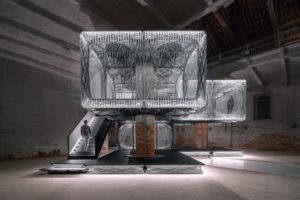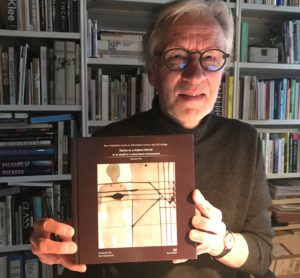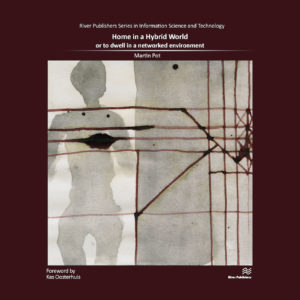Interessante benadering en recente bespreking van mijn boek door (architectuur)filosoof Eric Bolle op zijn website….
Auteur archieven: martinpot
Aerodreams
Wonderful, illustrative and well-documented exhibition in Centre Pompidou Metz: ‘Aerodreams‘, “The exhibition reveals this human dimension of the «pneumatic», from the first industrial and military exploitations (airships, weather balloons, floating assemblies, inflatable decoys…) to the experiences developed by numerous artists designers and architects.” From Buckminster-Fuller’s dome over Manhattan to Haus-Rucker’s extension at the Kassel- Documenta this is again an actual topic worth-while presenting and discussing.
https://www.centrepompidou-metz.fr/en/aerodream-architecture-design-and-inflatable-structures-1950-2020
Maison Fibre
Most interesting, innovative and seemingly beautiful as well: the Maison Fibre, a research project from the University of Stuttgart on show at the Venice Biennale Architettura 2021,”explores an alternative approach to the design and construction of future habitable spaces.”

book talk & interview
Nice online talk and interview with Philippa Jefferies from RIVER Publishers after the publication of my book ‘Home in a Hybrid World’. On original intend, on the role of technology, on the consequences caused by covid, etc.
Kengo Kuma architect
Lovely and interesting documentary about and interview with the Japanese architect Kengo Kuma; illustrating ways of creating and adapting architecture to actual circumstances and at the same time use history and nature to create synchronized environments.
Architectuur & Technologie sessie AIR
Op donderdag 22 april 2021 vond een (besloten/online) expert-sessie plaats, georganiseerd door AIR – aansluitend op het Stadsmakers Congres – rond het thema ‘Architectuur en Technologie’; met korte presentaties/lezingen van Martin Pot (martin pot interiors), Wessel van Beerendonk (Studio RAP) , Johan Hanegraaf (Arkio) ; gevolgd door discussies met overige participanten en gemodereerd door Leon van Geest. Deze sessie zal op een later moment door AIR online worden gezet.
Butohouse
The French filmakers Ila Bêka & Louise Lemoine , famous for their documentary film ‘Houselife’ of Rem Koolhaas’ Bordeaux House in which housekeeper Guadalupe Acedo verbally guides a tour around the house, have produced a new, rather intimate portrait of Keisuke Oka, a butoh dancer. A Japanese man building his ‘house’, folly, shell in an adapted area of Tokyo; a ‘small universe built and thought in a rare freedom’, built over a period of 15 years.
shelter, or dwelling?
In the Netherlands some 40.000 (registered) people are homeless; in all of Europe it is some 4 million. A recent initiative in the city of Ulm, Germany shows a ‘sleeping pod’ as a solution for shelter, complete with solar panels, electricity and a connection to a network. In the technical sense this is nothing new; see the wide variety of innovative projects devoted to elementary shelters over the decades. Of course: the need for protective measures in winter is urgent, the question that remains is whether this is a structural or temporal solution. After all, the ‘inhabitant’ still is excluded from society; while a more permanent place to dwell (as is a legal right) is far more necessary. Ultimately the focus should be on a real integrated ‘place’ within larger scales, i.e. as part of an environment that includes space for shelter, be it temporary or more permanent. So; reserve a certain amount of space within each housing project to function as ‘free space’ when needed, as part of the community.
https://www.independent.co.uk/news/world/europe/homeless-sleeping-pods-germany-ulm-b1791217.html
interview
now online; my interview last week with RIVER Publishers’ Philippa Jefferies about my recently published book, also available via open-access at RIVER Publ. A brief talk about home, housing, technology and dwelling; to end with an actual part about the consequences for our housing caused by the current corona pandemic. It illustrates once more that the way we built our housing needs much more flexibility and adaptability.
Home in a Hybrid World, a book published
After some delay at the publisher mainly caused by corona my book is finally ready and accessible for download; many sincere thanks to all artists (Antony Gormley, Carlijn Kingma, Marwan Rechmaoui and Rob Voerman), reviewers Marja Elsinga, Frans Vogelaar & Elizabeth Sikiaridi, Gerald Santucci, Ruud Hazes and Tijmen Wisman and various column-writers who contributed to this final result. I look forward to the discussions and further developments, aiming at a structural change when it comes to (re)thinking and building our housing in a networked environment. This website will, in the coming months, also be devoted to the further discussions following reading by as many researchers, artists and the professionals possible.

see: RIVER Publishers

